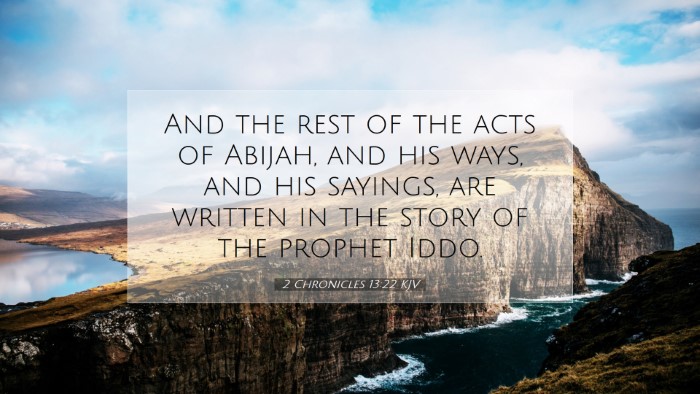Commentary on 2 Chronicles 13:22
2 Chronicles 13:22 states, “The rest of the acts of Abijah, and his ways, and his sayings, are written in the story of the prophet Iddo.” This verse concludes the account of King Abijah of Judah, affirming the importance of the prophetic tradition in recording the history of the nation. This commentary seeks to delve into the implications and insights derived from this verse through the lens of public domain resources, namely the works of Matthew Henry, Albert Barnes, and Adam Clarke.
Context and Historical Background
Abijah, the son of Rehoboam and grandson of Solomon, reigned over the southern kingdom of Judah for only three years. His reign is characterized by his military conflict with Jeroboam, the first king of Israel. The prevailing theological framework found in Chronicles especially emphasizes the fidelity to God and adherence to His covenant, contrasting the successes of kings who honored God with the failures of those who did not.
Theological Themes
-
The Role of Prophecy
The mention of “the story of the prophet Iddo” signifies the importance of prophetic voices in the history of Israel. Iddo was not merely a passive observer but an active participant in declaring God’s message. This emphasizes the belief in divine providence guiding the history of His people.
-
Legacy of Leadership
Abijah’s brief reign serves as a reminder of the transient nature of kingship. His deeds and words are preserved for future generations, illustrating the significance of righteous leadership. As Matthew Henry notes, kings are not above God's scrutiny, and their legacies are often shaped by their faithfulness or lack thereof.
-
Historical Accountability
Albert Barnes points out that the acts of rulers are recorded not just for historical documentation but also for moral reflection. This invites present and future leaders to consider their actions and the weight of their decisions in divine history.
Insights from Matthew Henry
Matthew Henry comments that Abijah’s reign, although short-lived, was notable for its connection to the prophetic tradition. He emphasizes that the recording of Abijah's acts in the writings of Iddo serves as a reminder that history is shaped by divine oversight and moral judgment. The prophet Iddo's narrative provides valuable insights into the spiritual climate of the times, illustrating both the challenges and victories faced by God’s people.
Insights from Albert Barnes
Albert Barnes adds that the allusion to Iddo's writings underscores a specific theological point: God preserves the records of His people, ensuring that their stories serve as moral exemplars for future generations. The record of Abijah is not merely for knowledge but serves as a lesson for all who would study it. Barnes highlights the consistency of God's judgments throughout the biblical narrative, notably regarding the expectations set upon leaders.
Insights from Adam Clarke
Adam Clarke provides a detailed examination of the historical and prophetic context surrounding Abijah. He notes that while Abijah engaged in conflict with Jeroboam, his reliance on God was pivotal for any success realized during his reign. Clarke emphasizes Iddo's influence as a prophet in Judah, reminding us that prophecy plays a critical role in guiding and admonishing leaders. Leaders, like Abijah, must be responsive to God’s revelation, which remains a timeless truth across various contexts.
Application for Leaders and Theologians
This verse carries significant lessons for present-day leaders, pastors, students, and scholars. Understanding the importance of prophetic voices in one’s context can amplify the effectiveness of leadership. Embracing accountability as found in this record can inspire theological reflection and personal growth.
-
Reflection on Leadership
Leaders are called to assess their motives and actions against the standards set forth in Scripture. As Abijah is remembered through Iddo’s writings, contemporary leaders must consider how their legacy is being written today.
-
Embracing Prophecy
The relevance of prophetic voices should not be underestimated. The church today must remain open to the messages that guide spiritual direction and societal impacts.
-
Covenant Faithfulness
Abijah's narrative reinforces the importance of steadfastness in the covenant with God, encouraging believers to uphold their commitments to God and His purposes.
Conclusion
2 Chronicles 13:22 serves as a pivotal reminder of God's enduring narrative through the prophetic tradition. As we study the brief yet impactful reign of Abijah, we learn that even moments of human leadership are steeped in divine significance. The works of Matthew Henry, Albert Barnes, and Adam Clarke provide a rich tapestry of insights enabling us to reflect meaningfully on our roles within the continuation of God’s story.


